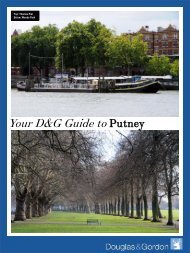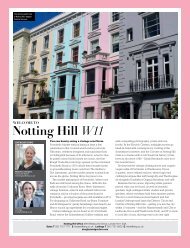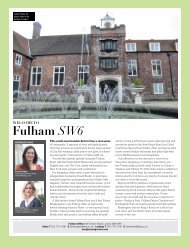Bridge Magazine - Part 1
OUR HOME, YOUR LONDON FROM DOUGLAS
OUR HOME, YOUR LONDON FROM DOUGLAS
You also want an ePaper? Increase the reach of your titles
YUMPU automatically turns print PDFs into web optimized ePapers that Google loves.
him to stay in bed, sometimes for a month at a time.<br />
this spelled a frustrating time for siegfried<br />
sassoon, with whom he conducted an affair<br />
through the 1920s and 1930s. the first world<br />
war poet and pacifist was in equal parts<br />
intoxicated by this graceful butterfly of a man,<br />
while reviling his set for their blind frivolity<br />
against the growing seriousness of the political<br />
backdrop. the older man’s innate puritanism<br />
saw him entreat the younger to absent himself<br />
from the circus of inane revelry and his starring<br />
role in the gossip pages – a task which proved<br />
futile. in the face of such disapproval, tennant<br />
dropped sassoon abruptly.<br />
central also to the action was the<br />
ever-present elizabeth ponsonby,<br />
daughter of labour mp Arthur<br />
ponsonby and his wife dorothea,<br />
both of whose diaries and letters<br />
attest to the overwhelming and,<br />
at times, hopeless concern they<br />
felt for their much-loved child’s<br />
welfare. elizabeth lived beyond<br />
her means always, worked as an<br />
actress occasionally and, towards<br />
the end of her life, as a nightclub<br />
hostess. her general attitude to life<br />
was to derive as much hedonistic<br />
pleasure from it as possible, while<br />
all the time being subsidised<br />
by her father’s modest income.<br />
famous essentially for going to<br />
parties, she is said to have been<br />
the life and soul of these frequent<br />
gatherings, her tragedy lying in the<br />
fact that she couldn’t acknowledge<br />
when the party was over. married<br />
and divorced, the subject of many<br />
column inches, the once ebullient<br />
but later penniless elizabeth<br />
descended into alcoholism, a<br />
condition which proved fatal<br />
when she died before reaching<br />
her fortieth birthday, a sort of<br />
cautionary tale of what it is to try<br />
and hang on to the brightness of<br />
youth while blindly shunning life’s<br />
more serious repercussions.<br />
meanwhile, the eton- and<br />
oxford-educated poet brian<br />
howard, who was notable for his<br />
quick temper, licentiousness and<br />
the absence of an actual body of work, also fell<br />
into alcoholism, eventually committing suicide<br />
over the accidental death of a lover. the<br />
actress and it-girl brenda dean paul’s fate too<br />
was sealed the first time she was introduced to<br />
morphine, succumbing eventually as she did to<br />
a full-blown heroin addiction.<br />
there existed, however, those bright young<br />
people who didn’t fail to notice that the music<br />
had stopped with the onset of the 1930s.<br />
interestingly, the more serious-minded of the<br />
set tended to be those who never felt entirely<br />
part of it, whose backgrounds were inescapably<br />
middle-class rather than aristocratic. evelyn<br />
waugh, for example, was a hard-drinking<br />
Evelyn Waugh<br />
young man who frequented the parties but<br />
remained on the group’s periphery. but while<br />
he partook, he was also prolific. rather than<br />
spend his days waiting for the next byt stunt,<br />
waugh used his time to write, drawing on the<br />
extraordinary figures of the social circle as<br />
inspiration, his detachment adding to his ability<br />
to see it for what it was. As mentioned, stephen<br />
tennant provided him with the ingredients<br />
for sebastian flyte and brian howard<br />
for Anthony blanche, while the<br />
quickly penned Vile Bodies is<br />
seen as the definitive account<br />
of those heady years.<br />
cecil beaton, meanwhile, spent his youth<br />
longing to be taken up as a bright young thing,<br />
and was beside himself with delight when<br />
the invitations to country estates rolled in. but<br />
while the names of many whose summons so<br />
thrilled him now languish in obscurity, beaton’s<br />
is celebrated, with v&A exhibitions devoted to<br />
him decades after his death. the photographer<br />
realised, after all, that while parties were a delight,<br />
they were also a way of making connections.<br />
the consummate networker, beaton outgrew<br />
the frolics and set his eyes on America, where<br />
he made his name at Vogue. back on british turf<br />
he practically became the court snapper.<br />
Another outsider was tom driberg, the<br />
FEATURE<br />
journalist who affected to be a bright young thing,<br />
attending the myriad of parties, while nipping off<br />
to the telephone at intervals to report on them for<br />
his newspaper column. while it may have earned<br />
him a certain mistrust by his peers (though they<br />
were often simply too intoxicated to notice), this<br />
early work ethic stood him in good stead for his<br />
later career as chairman of the labour<br />
party, and crossword setter<br />
at private eye.<br />
the anomalous<br />
mitfords meanwhile,<br />
though high born,<br />
never conformed<br />
to anything in their<br />
lives, not even<br />
the frequently<br />
doomed trajectory<br />
of the bright<br />
young aristocratic<br />
thing. nancy was a<br />
keen observer of all<br />
aspects of life (family,<br />
parties, la vie française)<br />
and scribbled it all down<br />
for the delight of her readers,<br />
before finally absenting herself<br />
and living in paris. in the meantime,<br />
her sister diana spent the 1930s<br />
lunching with hitler and rallying<br />
for her husband oswald mosley,<br />
the leader of the british union of<br />
fascists; consequently she spent<br />
much of the war in prison.<br />
for some, the movement was<br />
a springboard for success and<br />
for others its excesses spelled<br />
destruction. but, like the brightest<br />
of shining stars, its light had to<br />
eventually dwindle and 1929<br />
marked the beginning of the<br />
end. by the 1930s, those who had<br />
moved on were those who would<br />
be its survivors, while those who<br />
insisted on continuing the revelry<br />
found their once exquisite selves<br />
dimmed and ultimately dying.<br />
were they all bright? certainly<br />
they were young, but brightness<br />
can only be ascribed to a handful.<br />
upon which note, we leave the<br />
last word to the irrefutably bright<br />
waugh, who recalls the days of the media circus<br />
in Vile Bodies: “…masked parties, savage<br />
parties, victorian parties, greek parties, russian<br />
parties, circus parties, parties where one had to<br />
dress as somebody else, almost naked parties<br />
in st John’s wood, parties in flats and studios and<br />
houses and ships and hotels and nightclubs, in<br />
windmills and swimming baths, tea parties at<br />
school where one ate muffins and meringues and<br />
tinned crab, parties at oxford where one drank<br />
brown sherry and smoked turkish cigarettes,<br />
dull dances in london and comic dances in<br />
scotland and disgusting dances in paris – all the<br />
succession and repetition of massed humanity…<br />
those vile bodies.”<br />
TheRe<br />
exisTeD Those<br />
BRighT young<br />
peopLe who<br />
DiDn’T faiL To<br />
noTiCe The MusiC<br />
haD sToppeD<br />
BRIdGE MAGAZINE 33


















